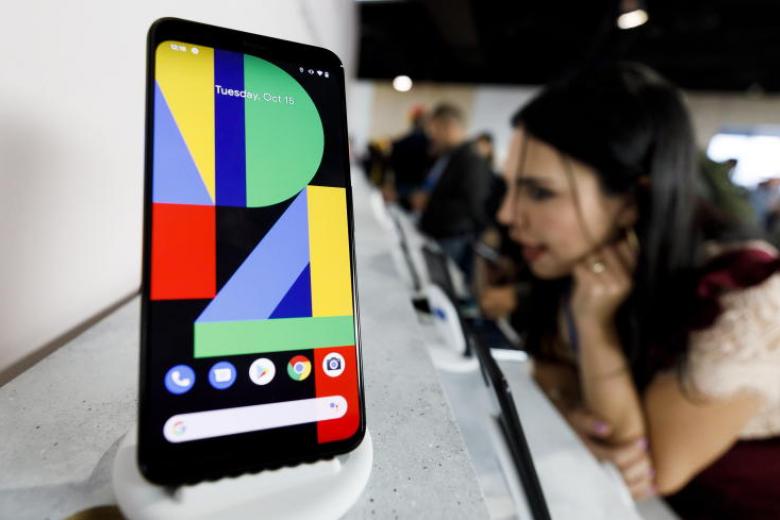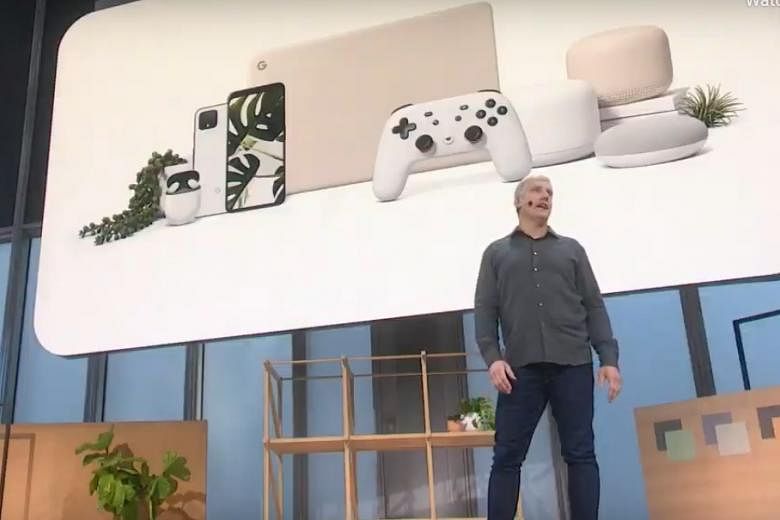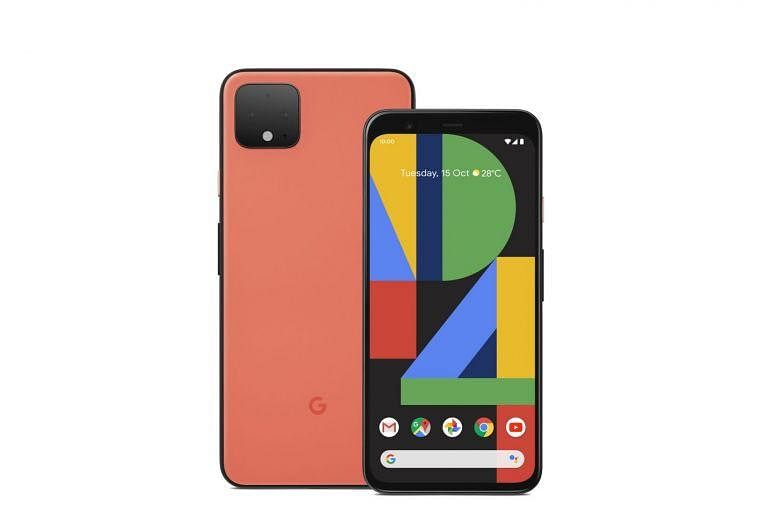NEW YORK - Google has added a new way to interact with its latest Pixel 4 smartphone.
The tech giant unveiled two versions of the Pixel 4 at an event in New York City on Tuesday (Oct 15). Both the 6.5-inch Pixel 4 XL and the 5.7-inch Pixel 4 are identical in every way except for their screen sizes and batteries.
Available in black, white and orange colours, the Pixel 4 phones will be available in Singapore from Oct 24 through StarHub, Challenger and Courts, as well as the Google Store. The Pixel 4 XL is priced at $1,319 (64GB) and $1,469 (128GB) while the Pixel 4 costs $1,119 (64GB) and $1,269 (128GB).
While last year's Pixel 3 was available in 13 countries, the Pixel 4 will be available in 12 countries, with India missing out.
Among the Pixel 4's new features are radar-powered hand gestures and facial recognition. The former, dubbed Motion Sense, lets users control the phone by waving their hands in front of the phone instead of touching it. These gestures can be used to snooze alarms, silence incoming phone calls and skip audio tracks.
Motion Sense is enabled by a miniature radar sensor, which also senses when you are reaching out to the phone and automatically triggers the new face unlock feature on the Pixel 4 phones. Like the latest Apple iPhones, the Pixel 4 uses facial recognition and lacks a fingerprint sensor.
Thanks to its radar sensor, the "Pixel 4 has the fastest face unlock on a phone", said Google vice-president of product management Sabrina Ellis. She added that Motion Sense can be disabled and all processing is done locally on the phone without any data being saved or shared with other Google services.
Mr Parv Sharma, an analyst at market research firm Counterpoint, told The Straits Times that the Pixel 4 has a substantial top bezel to accommodate the Motion Sense radar. So, it makes sense for Google to use this same bezel for the 3D camera sensor required for secure facial recognition.
The Pixel phones are known for their photo-taking capabilities, especially in low light, despite having a single 12-megapixel (MP) camera. For the Pixel 4, Google has added a second 16MP telephoto camera to improve photos taken from a distance. But Google is still heavily using software smarts and machine learning to improve its camera.
For instance, Google's low-light Night Sight mode has been enhanced with a new astrophotography capability for better shots of the night sky and stars. And because this mode is based on software, it will be available for the Pixel 3 models with a camera app update.
Other hardware upgrades include a smoother and more responsive display as well as a faster processor.
Also making its debut on the Pixel 4 is the next-generation Google Assistant software. First revealed at Google's annual developer conference earlier this year, the Google Assistant can now runs locally on the phone instead of sending requests to the cloud.
As a result, the Google Assistant can answer a user's queries up to 10 times faster. It will also feel more personalised, as it can understand references to family members or contextual cues like the time of the day.
PIXEL SALES NOT MOVING THE NEEDLE
Despite selling its Pixel phones for over three years, Pixel sales have yet to take off globally. While the company has never shared actual sales numbers, market research firm IDC estimated that Google had less than 1 per cent share of the global smartphone market in the first half of 2019.
Mr Thomas Husson, principal analyst at market research firm Forrester, said: "Pixel smartphones demonstrate Google's willingness to more tightly integrate hardware and software a la Apple, but they have not been a massive sales success story for now."
Pixel sales did receive a significant boost in the second quarter of the year after Google released new, cheaper Pixel 3a models in May, revealed Google chief executive Sundar Pichai during an earnings call in July.
But Mr Husson said that Google needs to improve its "retail execution and partnerships with telcos" and show that the Pixel's tight integration with Android delivers a better experience than its competitors.
Google's Pixel 3 phones are available in just 13 countries. In comparison, Apple's iPhone 3G was sold in 22 countries over a decade ago.
In Singapore, the Pixel phones have "struggled to find much love from Singaporeans", said Mr Loo Wee Teck, head of consumer electronics research at market research firm Euromonitor International. He said that the Pixel phones are not competitive enough with other manufacturers in terms of pricing, design and features.
"While Pixel phones offer timely updates, most users in Singapore replace their smartphones every 18 months, which renders the Pixel's only advantage redundant," he said.
OTHER GOOGLE HARDWARE UPDATES
Google also refreshed its popular Home Mini smart speaker, which is now called the Nest Mini in line with Google's Nest branding for smart home devices. It relies on the Google Assistant to help users with informative queries and everyday tasks.
The new version looks identical to the previous model, but with a mounting hole to hang the device on a wall. Google says the Nest Mini offers two times stronger bass than its predecessor while the Google Assistant will now run faster thanks to a new dedicated chip. Its price, though, remains unchanged at US$49.
Also announced was the Nest Wifi whole-home system, which consists of a standalone Wi-Fi router unit accompanied by a wireless extender called the Nest Wifi Point. Besides extending the range of a user's home network, the Point also doubles as a Google Assistant-enabled speaker like the Nest Mini. It will be available from Nov 4 in eight countries from US$269 for a two-pack (router and extender).
The Nest Mini will be available in Singapore from Oct 23 at $79 through the Google Store, Challenger and Courts.
The Nest Wifi router ($229) and the Nest Wifi point ($199) will be available in Singapore later in the year.
Other hardware refreshes announced include a new affordable 13.3-inch Chromebook, the Pixelbook Go, which starts at US$649. Google also offered a sneak peek of the new Pixel Buds, a pair of true wireless earphones that will be launched next year at US$179.




